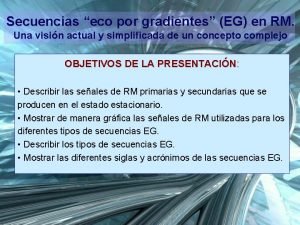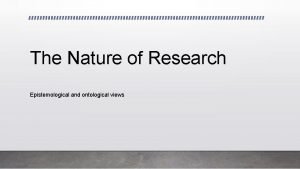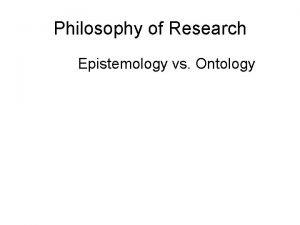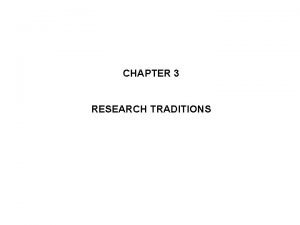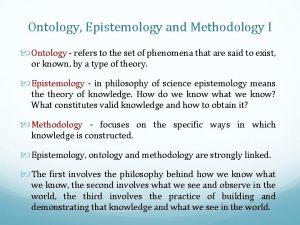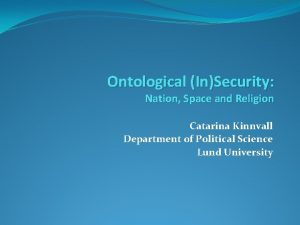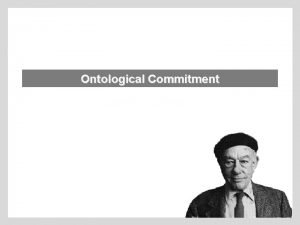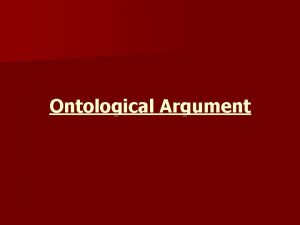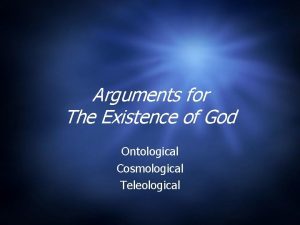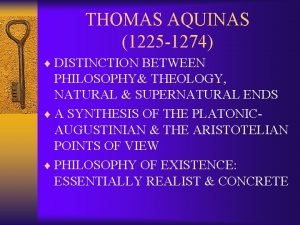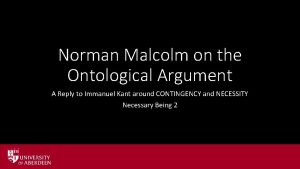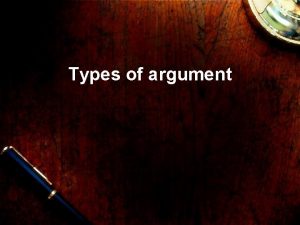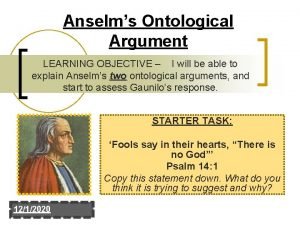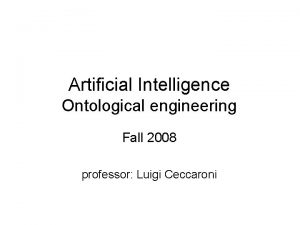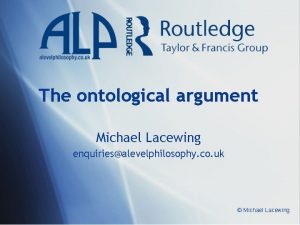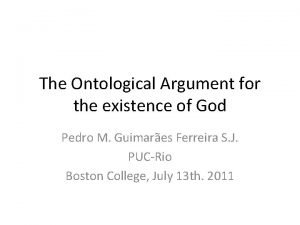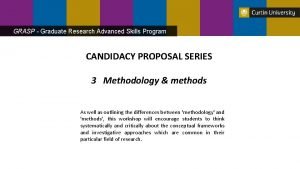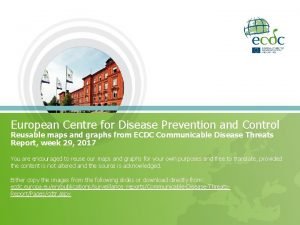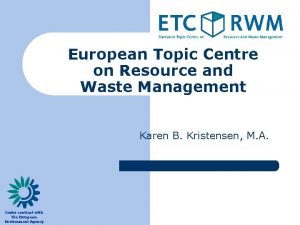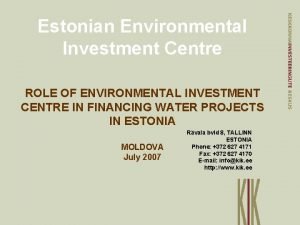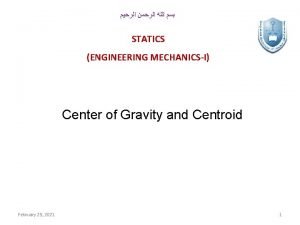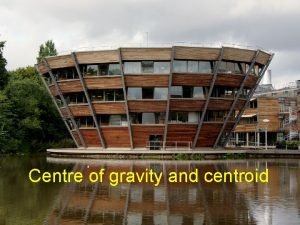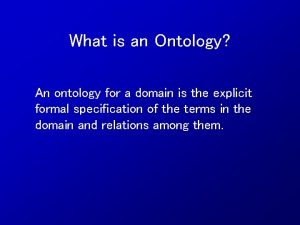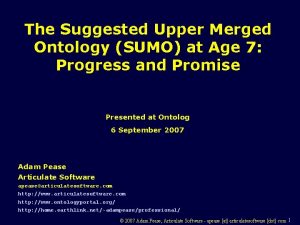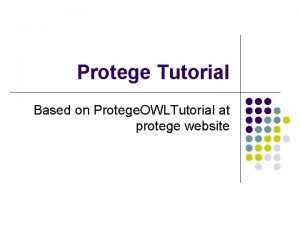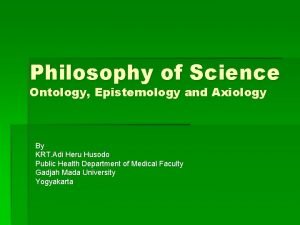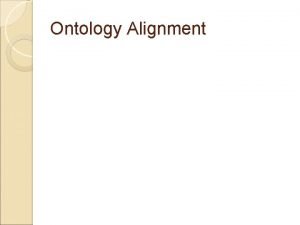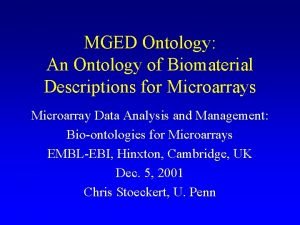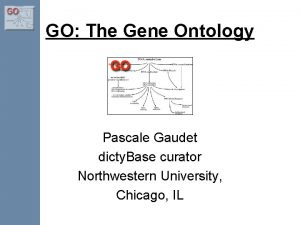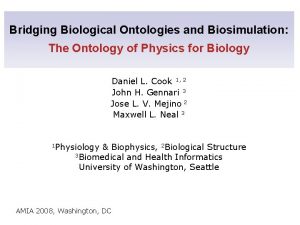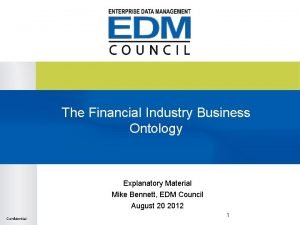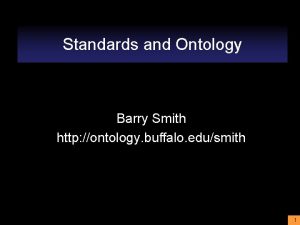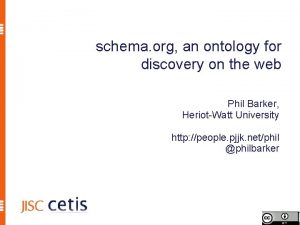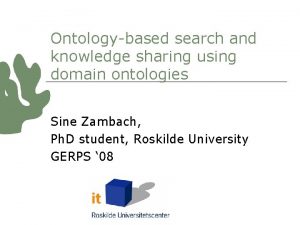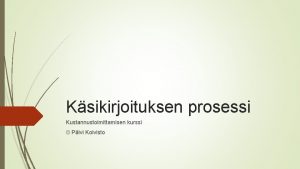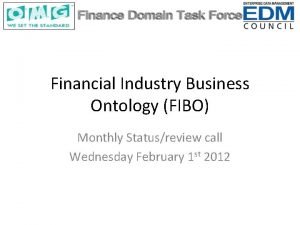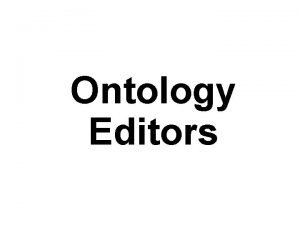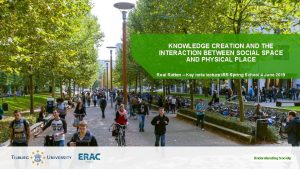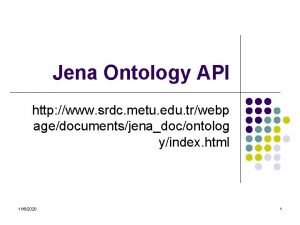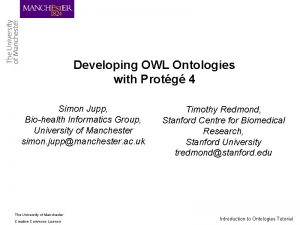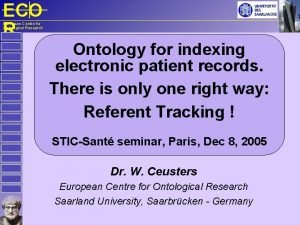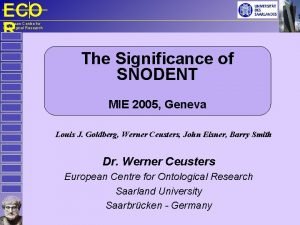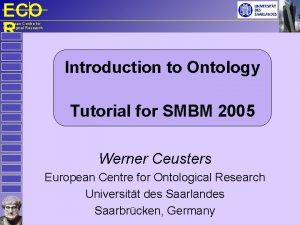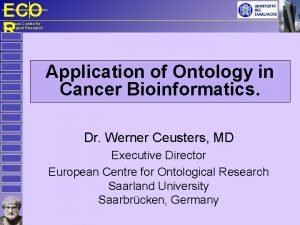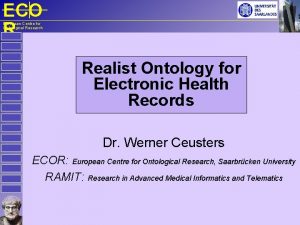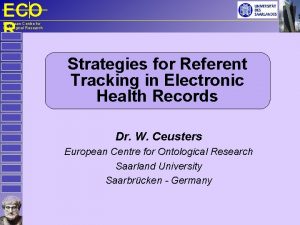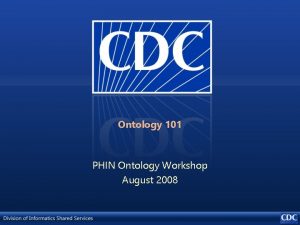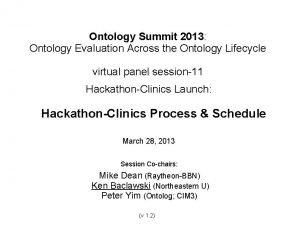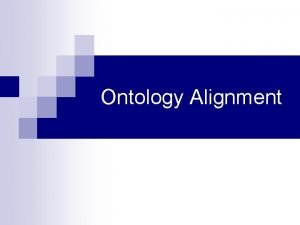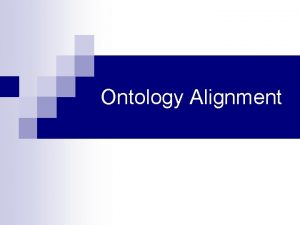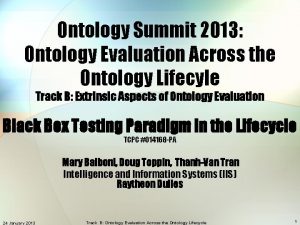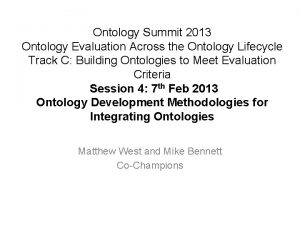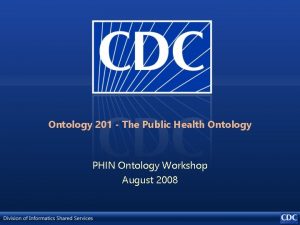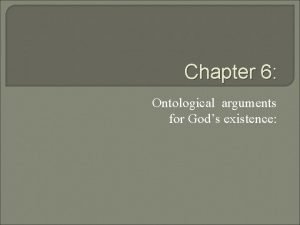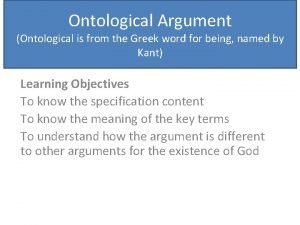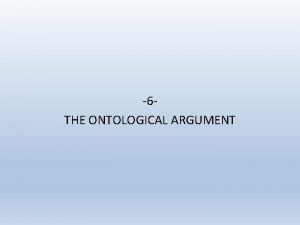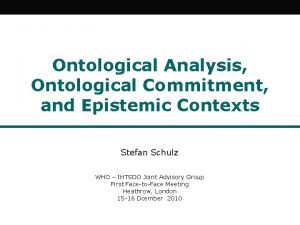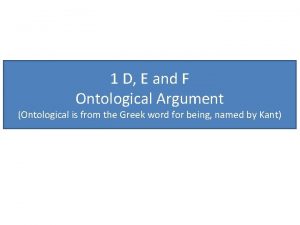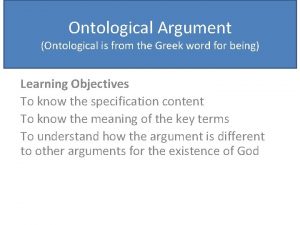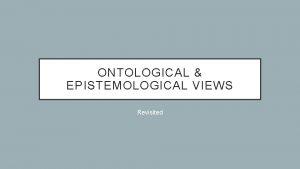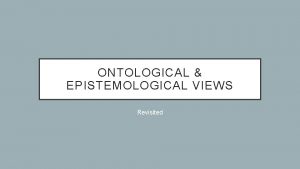ECO R European Centre for Ontological Research Ontology












































- Slides: 44

ECO R European Centre for Ontological Research Ontology for Medical Emergency related Resource Location Werner Ceusters European Centre for Ontological Research Universität des Saarlandes Saarbrücken, Germany

ECO R European Centre for Ontological Research • • • Presentation overview Professional background Ontology and terminology Concepts as the source of all evil Realist ontology Setting the scene for an ontology of emergency medicine

ECO R Short personal history European Centre for Ontological Research 1977 1959 -. . . 2004 1989 2002 1998

ECO R European Centre for Ontological Research External members Local members Partners Status April 8, 2005

ECO R European Centre for Ontological Research Directors Management Board Member representatives Advisory Board Status April 8, 2005

ECO R Institute for Formal Ontology European Centre for Ontological Research and Medical Information Science • an interdisciplinary research group – – – Philosophy, Computer and Information Science, Logic, Medicine, Medical Informatics. • a center of theoretically grounded research in both formal and applied ontology. • Main goal: to develop a formal ontology that will be applied and tested in the domain of medical and biomedical information science.

ECO R European Centre for Ontological Research IFOMIS competences Status April 8, 2005

ECO R European Centre for Ontological Research “Ontology”

ECO R If, later, you can remember just one European Centre for Ontological Research thing of this presentation, then make sure it is this one: If you use the word “ontology”, ALWAYS be specific about what you mean by it.

ECO R European Centre for Ontological Research Tom Gruber’s view • The word "ontology" seems to generate a lot of controversy in discussions about AI. It has a long history in philosophy, in which it refers to the subject of existence. It is also often confused with epistemology, which is about knowledge and knowing. • In the context of knowledge sharing, I use the term ontology to mean a specification of a conceptualization. That is, an ontology is a description (like a formal specification of a program) of the concepts and relationships that can exist for an agent or a community of agents. This definition is consistent with the usage of ontology as set -of-concept-definitions, but more general. And it is certainly a different sense of the word than its use in philosophy.

ECO R European Centre for Ontological Research The O-word in science N. Guarino, P. Giaretta, "Ontologies and Knowledge Bases: Towards a Terminological Clarification". In Towards Very Large Knowledge Bases: Knowledge Building and Knowledge Sharing, N. Mars (ed. ), pp 25 -32. IOS Press, Amsterdam, 1995.

ECO R The O-word in buzz-speak European Centre for Ontological Research • “An ontology is a classification methodology formalizing a subject's knowledge or belief system in a structured way. Dictionaries and encyclopedias are examples of ontologies. ” (X 1) • “A terminology (or classification) is a kind of ontology by definition and it should preserve (and "understand") the relationships between the 1, 000 s of terms in it or else it would become a mere dictionary (or at best a thesaurus). ” (X 2) • “Ontologies are Web pages that contain a mystical unifying force that gives differing labels common meaning. ” (X 3)

ECO R European Centre for Ontological Research Today’s biggest problem: a confusion between “terminology” and “ontology” • The conditions to be agreed upon when to use a certain term to denote an entity, are often different from the conditions which make an entity what it is. – Trees would still be different from rabbits even if there were no humans to agree on what names we should use to refer to them • “ontos” means “being”. The link with reality tends to be forgotten: one concentrates on the models instead of on the reality.

ECO Use Case: Semantic Discovery R of Community of Practice European Centre for Ontological Research COCOON Working Draft 16 Decembre 2004 2. 5. 1 Ontologies. First of all we need : • • a set of ontologies that provide the terminology used later. We introduce: an advice service terminology for specifying the action of a general practitioner asking a Co. P for an advices, a set of domain terminologies for specifying the case the general practitioner is asking an advice for (in the mock-ups presented in sections sec: mock-up we decide to use a small breast cancer ontology), a date and time terminology for specifying days of the week, hours of the day and intervals required for arranging a meeting, and a terminology of the available communication channels used during the virtual meeting that will take place after the arrangement.

ECO R European Centre for Ontological Research Terminology • A theory concerned with those aspects of the nature and the functions of language which permit the efficient representation and transmission of items of knowledge (J. Sager) • Precise and appropriate terminologies provide important facilities for human communication (J. Gamper)

ECO R European Centre for Ontological Research Ontology What it means if we use the word A proposal put forward by the SI roadmap pannel • An ontology is a representation of some preexisting domain of reality which – (1) reflects the properties of the objects within its domain in such a way that there obtains a systematic correlation between reality and the representation itself, – (2) is intelligible to a domain expert – (3) is formalized in a way that allows it to support automatic information processing

ECO R European Centre for Ontological Research Reality: not just a matter of view Copyright 2001, United Feature Syndicate Inc.

ECO R European Centre for Ontological Research A division of labour • Terminology: – Communication amongst humans – Communication between human and machine • Ontology: – Representation inside a machine of reality as it exists outside the machine • a representation is not a model or a simplification; ‘cats’ is not a simplification of cats – Communication amongst machines – Interpretation by machines

ECO R European Centre for Ontological Research Current “state of the art” in biomedical informatics • A pervasive bias towards “concepts” – Content wise: • Work based on ISO/TC 37 that advocates the Ogden -Richards theory of meaning • Corresponds with a linguistic reading of “concept” – Architecture wise: • In Europe: work based on CEN/TC 251 WG 1 & WG 2 that follow ISO/TC 37 • In the US: HL 7, inspired by Speech Act Theory • “Concepts” used as elements of information models, hence mixing a linguistic and engineering reading.

ECO R European Centre for Ontological Research “Ontology” An ontology defines the terms used to describe and represent an area of knowledge, and are used by people, databases, and applications that need to share domain information (a domain is a specific subject area, such as health or medicine). e-Health - making healthcare better for European citizens: An action plan for a European e-Health Area COM (2004) Use 356 Cases final, 30. 4. 2004, p 17 OWL Web Ontology Language; and Requirements W 3 C Recommendation 10 February 2004 http: //www. w 3. org/TR/webont-req/

ECO R European Centre for Ontological Research “Ontology” • Ontologies need to specify descriptions for the following kinds of concepts: – Classes (general things) in the many domains of interest – The relationships that can exist among things – The properties (or attributes) those things may have OWL Web Ontology Language; Use Cases and Requirements W 3 C Recommendation 10 February 2004 http: //www. w 3. org/TR/webont-req/

ECO R Semantic Interoperability European Centre for Ontological Research • Semantic interoperability is the ability for information shared by systems to be understood at the level of formally defined domain concepts so that the information is computer processable by the receiving system – Text used in the CEC documents – Taken over by Artemis

ECO ‘Concepts’ are the bad guys: R European Centre for Ontological Research ‘Concept’ used in ‘ontology’ is used for different things • meaning shared in common by synonymous terms • idea shared in common in the minds of those who use these terms • unit of knowledge describing meanings • universal, feature or property shared in common by entities in the world

ECO R What concepts allow you to do European Centre for Ontological Research • • Horse ISA mammal One-horned mammal ISA mammal Rhinoceros ISA one-horned mammal Unicorn ISA one-horned mammal Facts and fictions run together • Small horse ISA horse • Horse in the zoo of Antwerp ISA horse • Horse that won the St. Gallen Steeple Chase in 2005 ISA horse Statements disguised as concepts

ECO R Origine: the semantic triangle European Centre for Ontological Research • In Information Science: – “An ontology is a description (like a formal specification of a program) of the concepts and relationships that can exist for an agent or a community of agents. ” • In Philosophy: – “Ontology is the science of what is, of the kinds and structures of objects, properties, events, processes and relations in every area of reality. ” concept term referent

ECO R The price you pay if you go European Centre for Ontological Research for concepts. . . (just one example) UMLS Semantic Network – What does A relation B means ? – Normally: for all a’s that are A’s, there is some b that is a B, such that the relation holds from a to b – Very relaxed: for some a’s there might be a b such that a relation b – But even that doesn’t work for the relationship prevents

ECO R European Centre for Ontological Research Ok, some more. It’s just too funny. . . • UMLS-SN: – Bacterium causes Experimental model of disease – Educational activity associated with pathologic function • HL 7: Individual Allele is_a Act of Observation • GO: Menopause part_of Death • GALEN: – Female Pelvic Cavity Contains Uterus (this is ok, but compare. . . ) – Vomitus Contains Carrot – Speech Contains Verbal Statement

ECO R European Centre for Ontological Research ‘Well, that’s because they don’t use description logics or OWL’ You really think so ? SNOMED-RT (2000) SNOMED-CT (2003) DL don’t guarantee you to get parthood right !

ECO R European Centre for Ontological Research F-DL (Frankenstein’s DL)

ECO R European Centre for Ontological Research Our way: Realist Ontology • Central are the “particulars” (p) – Me, you, my heart, that patient’s fracture, that car accident (which caused his fracture), … – ‘Referent tracking’ • Particulars instanciate classes (c) distinguished on the basis of ontological properties: – Essence, dependency, identity, relationship with time, … – Some classes are “universals” (u) • Define relationships axiomatically at four levels: – p, c – c, p – c, c – p

ECO R European Centre for Ontological Research BFO continuants

ECO R European Centre for Ontological Research Kinds of relations • <instance, instance>: – my heart part_of me • <instance, class>: – me instance_of human being • <class, instance>: – president of the US empowered_by US constitution (? ) • <class, class>: – gene expression has_agent RNA polymerase

ECO R European Centre for Ontological Research Parthood as a Relation between Instances • Introduced as primitive: – p part_of p 1 • Illustrated in assertions such as: – My heart part_of Werner Ceusters • Properties: – reflexivity: for all p, p part_of p, – anti-symmetry: for all p, p 1, if p part_of p 1 and p 1 part_of p then p and p 1 are identical, – transitivity: for all p, p 1, p 2, if p part_of p 1 and p 1 part_of p 2, then p part_of p 2.

ECO R European Centre for Ontological Research Parthood as a Relation between Classes • For continuants: (‘heart’, ‘person’) – C part_of C 1 =def. for all c, t, if c instance_of C at t then there is some c 1 such that c 1 instance_of C 1 at t and c part_of c 1 at t. • For processes: (‘menopauze’, ‘aging’) – P part_of P 1 =def. for all p, if p instance_of P, then there is some p 1 such that: p 1 instance_of P 1 and p part_of p 1. These definitions tell you ONLY something about C’s and P’s, but nothing about C 1’s and P 1’s !!!

ECO R European Centre for Ontological Research Possible variants • R 1(A, B) =: x (Inst(x, A) y(Inst(y, B) & Rxy)) – every A stands in relation R to some B • R 2(A, B) =: y (Inst(y, B) x(Inst(x, A) & Rxy)) – for each B there is some A that stands in relation R to it • R 12(A, B) =: R 1(A, B) & R 2(A, B) – every A stands in relation R to some B and for each B there is some A that stands in relation R to it Donnelly and Bittner, 2005

ECOProperties of relations among individuals vs. R properties of relations among classes European Centre for Ontological Research Among Individuals Among Classes R is. . . R 1 must also be. . . ? R 2 must also be. . . ? R 12 must also be. . . ? Reflexive Yes Yes Irreflexive No No No Symmetric No No Yes Asymmetric No No No Antisymmetric No No No Transitive Yes Yes Donnelly and Bittner, 2005

ECO R European Centre for Ontological Research GALEN assertions using is. Division. OF and has. Division GALEN’s is. Division. Of assertion GALEN’s has. Division BIT+Cl relation Female Pelvic Cavity is. Division. Of PP 1 Pelvic Part of Trunk none Prostate Gland is. Division. Of Genito-Urinary System none PP 1 none BIT+Cl relation Pelvic Part of Trunk has. Division Hair (PP-1)1 Left. Heart. Ventricle is. Division. Of Heart PP 12 Heart has. Division Left. Heart. Ventricle (PP-1)12 Prostate Gland is. Division. Of Male Genito-Urinary System PP 12 Male Genito-Urinary System has. Division Prostate Gland (PP-1)12 Urinary Bladder is. Division. Of Genito-Urinary System PP 12 none Pericardium is. Division. Of Heart none Heart has. Division Pericardium none Donnelly and Bittner, 2005

ECO R European Centre for Ontological Research Realist Ontology is alive • The gossip: – We are holding biomedical ontology in a strangle hold • The success stories (some recent examples): – Contributing to OBO ontologies requires adherence to the relations defined in Relations in Biomedical Ontologies, forthcoming in Genome Biology – Foundational Medical Anatomy (FMA) completely reworked, and basis forthcoming CEN standard – Previous IFOMIS collaborator hired by NLM to work on revision of Semantic Network – Barry Smith appointed by De Soto (Institute for Liberty and Democracy), funded by US Agency for International Development, to establish the philosophical underpinnings of property right.

ECO R European Centre for Ontological Research Towards an ontology for medical emergencies Preliminary thoughts to start discussion

ECO R DICOEMS ontology use case European Centre for Ontological Research • Main goal: – locating the suitable resources and experts that can treat the specific medical emergency case that the paramedics face in the ambulance. • Scenario: – expert in Emergency Centers search terms in natural language based on input from paramedics on site and telemedicine equipment – NLP processing of input to retain relevant words and their synonyms (Word. Net processing). – These words are used to retrieve concepts, terms and relations from an ‘ontology’ about cardiovascular diseases – Ontology entries are linked to available resources (hospitals, departments and experts) – Search output: in XML, concepts + codes that will form the input for the Resources mapping module.

ECO What are the particulars ? R European Centre for Ontological Research • The particulars of the ‘current case’ – The victim • The disorder(s) that constitute(s) the emergency case • His personal history • . . . – Time and place – The on site team • It’s experience, skills, . . . • . . . Referent tracking – On site equipment – The emergency centre specialist –. . . • The particulars of previous cases – Same as above, plus. . . outcomes

ECO R European Centre for Ontological Research Useful source for inspiration: Emergency Data Sets Framework An approach and tool to describe the world of data sets within the domain of health informatics. ISO TC 215/SC N Date: 2003 -05 -06 ISO/PDTR 1 ISO TC 215/SC /WG 1 Secretariat: ANSI

ECO Emergency Medical Service R Clinical & Interventional European Centre for Ontological Research • • • • Chief complaint Cause of injury Provider's impressions Pre-existing condition Signs and symptoms Injury description Injury intent Safety equipment / protection (seatbelt) Factors affecting EMS delivery of care Alcohol/drug use Trauma Score Procedure or treatment Medication name Treatment authorization Destination – Hospital case number – Physician/Nurse accepting patient – Time dispatched • CPR – – – – • Vital signs Time of first CPR Provider of first CPR Time CPR discontinued Time of witnessed cardiac arrest Witness to cardiac arrest Time of first defibrillatory shock Return of spontaneous circulation Pulse, heart rate, rhythm Respiratory rate Respiratory effort Blood pressure Skin perfusion Mental status – – – Glasgow eye-opening component Glasgow verbal component Glasgow motor component Glasgow Coma Psychological score (CRAMS)

ECO R European Centre for Ontological Research The division of labour • Ontology: – Identification of relevant particulars and classes – Identification and definition of relevant relationships at all levels – Adequate representation Machine – machine interfaces • Terminology: – Description of particulars, classes and relationships using natural language (terms) – Links to literature, databases, resource descriptions Man – machine interfaces
 Secuencias spin eco
Secuencias spin eco Epistemology vs ontology
Epistemology vs ontology Research ontology and epistemology
Research ontology and epistemology Ontology in qualitative research
Ontology in qualitative research Ontological philosophy
Ontological philosophy Diagram ontological argument
Diagram ontological argument Ontology vs epistemology
Ontology vs epistemology Ontological security
Ontological security On what there is
On what there is Teleological vs ontological
Teleological vs ontological Challenges to the ontological argument
Challenges to the ontological argument Ontological cosmological teleological
Ontological cosmological teleological Ontological argument for god
Ontological argument for god Ontological distance
Ontological distance Norman malcolm ontological argument
Norman malcolm ontological argument The ontological arguement
The ontological arguement Gaunilo's response to anselm's ontological argument
Gaunilo's response to anselm's ontological argument Ontological engineering in artificial intelligence
Ontological engineering in artificial intelligence Ontological argument
Ontological argument Ontological argument
Ontological argument Ontological definition
Ontological definition European centre for disease prevention and control
European centre for disease prevention and control European foundation centre
European foundation centre European topic centre
European topic centre Eic european investment centre
Eic european investment centre Centroid problems engineering mechanics
Centroid problems engineering mechanics How to find centre of gravity
How to find centre of gravity What is an ontologist
What is an ontologist Suggested upper merged ontology
Suggested upper merged ontology Napolen pizza
Napolen pizza Ontology, epistemology, axiology
Ontology, epistemology, axiology Ontology alignment
Ontology alignment Types of ontology
Types of ontology Pascale gaudet
Pascale gaudet Ontology in biology
Ontology in biology Financial industry business ontology
Financial industry business ontology Barry smith ontology
Barry smith ontology Schema.org ontology
Schema.org ontology Basic formal ontology
Basic formal ontology Ontology kurssi
Ontology kurssi Fibo ontology
Fibo ontology Ontology editors
Ontology editors Ontology creation
Ontology creation Jena ontology
Jena ontology Pizza ontology download
Pizza ontology download
